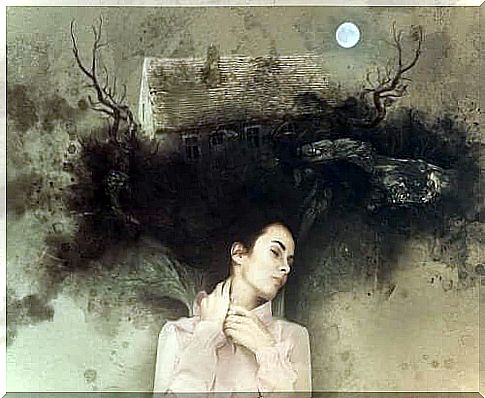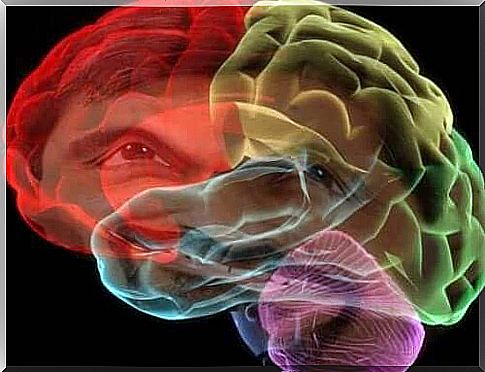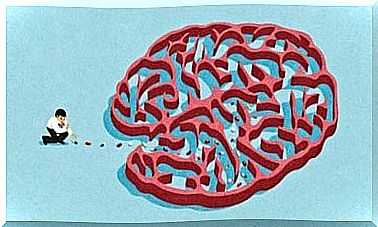Why We Forget Some Dreams

Man spends much of his life sleeping, immersed in a suggestive dream world and yet some dreams are forgotten. Why is this happening?
Regardless of the incredibly intense and almost vivid experiences, many dreams are still gone as soon as you wake up. Every image, every fragment and every memory evaporates like smoke subjected to a stream of air.
What is most noticeable is that for a brief moment you feel that if you try a little harder you could get that memory back. The bad news is that there’s no point in doing that, because all that’s left is the emotional imprint of the dream itself or the nightmare.
William Shakespeare said, “ People are made like dreams. It is true, there is an undeniable truth behind that poetic image.
Dreaming is an evocative mix of mental processes that encompass your memories and experiences and, in turn, a few strokes of creativity. A mixture of surrealism and fantasy. That’s because humans also have those fabulous resources.
Everyone would like to be able to remember every dream. The reason for this lies in the classical belief that one could get to know each other a little better by reminiscing every image, word, sensation and event that occurred in that dream.

Two reasons why we forget dreams
Some people have a curious tendency to remember many of their dreams and they seldom hesitate to share them with others. They try, as usual, to evaluate the symbolism and arrive at meaningful interpretations. However, others rarely remember anything from their dream universe. These people often claim that they are not dreaming.
However, you should know that everyone dreams because it not only allows you to promote that deep and soothing rest that is so essential to your health.
However, the brain also needs this process in order to learn, eliminate data that no longer serves you, and perform metabolic tasks for proper balance. That is, the brain must be able to “clean up.”
So, as experts say, out of 90 years a person lives, he will sleep for about 30 years. That’s 22 years in a deep sleep and seven years in dreaming. However, most people barely remember anything from those seven years. So why do we spend time on something that is so unproductive in terms of content?
The hippocampus pays no attention to your dreams
When you fall asleep, certain areas of the brain remain active. Studies show that there are incredibly active areas and one of them, the one that takes a long time to calm your activity, is the hippocampus. This area is related to your memory and is responsible for performing crucial tasks while you sleep.
What it basically does is relay the relevant information stored in your short-term memory to the area of your long-term memory. The hippocampus is, as it were, focused on very specific tasks.
These tasks keep you from paying attention to your dream world. In fact, the hippocampus doesn’t think it’s important. His work at that time is to consolidate learning and memories.
Basically, what happens in your dreams doesn’t interest your hippocampus that much. At least, that’s what several studies show, such as this one by Thomas Andrillon, neuroscientist at Monash University in Melbourne, Australia.
So, as observed in an MRI, the hippocampus sends information to the cortex, but the latter does not send information back to it.
There are times when you can remember something, such as an image, a feeling, or even a short scene. That chance increases if you wake up right after the dream. In these situations, scientists have shown that the memory of that dream experience lasts only a minute or two. However, you will soon forget it.

Low levels of acetylcholine and norepinephrine
There is a second reason why people forget some dreams. That theory (and in addition to the previous one) focuses on two very specific neurotransmitters, namely:
- acetylcholine
- noradrenaline
You should know that the levels of these two substances drop drastically in your brain when you fall asleep.
This phenomenon translates into a lower capacity to store memories. However, there is more. Studies show that when you enter the REM phase and cross the threshold of the dreams to immerse yourself in its kingdom, the levels of acetylcholine suddenly rise, but the adrenaline levels do not.
Therefore, you would have to have high levels of both neurotransmitters to remember what’s going on in that oneiric tissue. You won’t succeed with just one of them.
Why do you forget some of your dreams and remember others?
You already know that there are two reasons why you forget some of your dreams. The hippocampus and the neurotransmitters norepinephrine and acetylcholine make it difficult to make memories while you sleep.
However, experts in the field, such as sleep researcher Ernest Hartmann, a professor of psychiatry at Tufts University School of Medicine , point out that there is another reason that promotes this forgetfulness.
This is because dreams are not transcendent to your brain. They are of no use to its proper functioning. Actually, if you do remember them, it’s only for one very obvious reason. That is, they have an emotional component. The more intense they are and the more consistent their story, the more likely you are to remember them.
Dreams thus remain a mystery that still fascinates man. Both Freud and Carl Jung considered them indispensable to get to know man better. However, the brain itself throws information away and some dreams we simply forget. Ironically, your brain isn’t as interested in it as you are.









